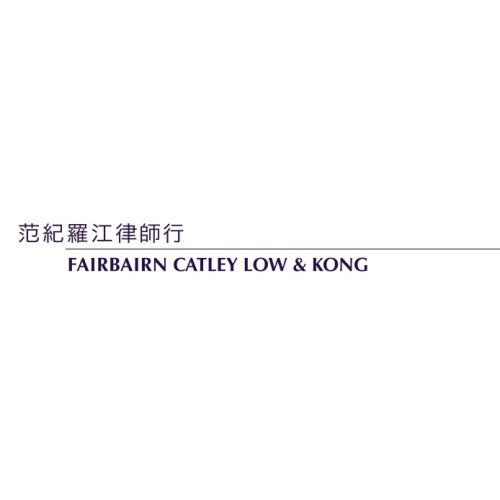Best Project Finance Lawyers in Wanchai
Share your needs with us, get contacted by law firms.
Free. Takes 2 min.
List of the best lawyers in Wanchai, Hong Kong
About Project Finance Law in Wanchai, Hong Kong
Project finance refers to the legal and financial structuring of large infrastructure and industrial projects, typically using a non-recourse or limited-recourse financial model, where the project's assets, rights, and interests serve as collateral for the financing. In Wanchai, Hong Kong, project finance is increasingly important for real estate developments, energy projects, public-private partnerships, and infrastructure works. The area hosts numerous local and international banks, developers, and multinational organizations, making it a hub for complex commercial transactions.
Why You May Need a Lawyer
Engaging a lawyer is crucial in project finance due to the complexity and high value of transactions. Common situations where legal help is needed include:
- Drafting and negotiating project finance agreements and loan documentation
- Structuring joint ventures or consortia for large projects
- Advising on regulatory compliance, licensing, and permits
- Due diligence on potential partners or project feasibility
- Resolving disputes related to project delays, cost overruns, or contractual breaches
- Facilitating cross-border transactions and compliance with international standards
- Mitigating risks through the identification and allocation of risks among parties
Local Laws Overview
Project finance transactions in Wanchai, Hong Kong are governed by a mixture of local statutes, common law, and regulatory frameworks. Relevant legal aspects include:
- Companies Ordinance: This governs the structure and operation of special purpose vehicles commonly used in project finance.
- Contract Law: Principles of contract law guide the formation, interpretation, and enforcement of project documentation.
- Securities and Futures Ordinance: Regulates the issuance of securities tied to project financing.
- Land and Property Laws: Property and leasehold rights are central to many project finance structures, especially in real estate and infrastructure sectors.
- Environmental and Planning Regulations: Projects must comply with environmental assessments and zoning requirements administered by government agencies.
- Banking and Lending Regulations: Require compliance with capital adequacy, anti-money laundering, and licensing laws.
Wanchai's legal environment is pro-business, transparent, and renowned for its adherence to the rule of law, which fosters confidence among project sponsors, lenders, and investors.
Frequently Asked Questions
What is project finance?
Project finance is a method of funding large-scale projects where repayment is based primarily on the project's future cash flows rather than the sponsors' balance sheets. Assets and revenue streams of the project serve as collateral.
What types of projects commonly use project finance in Wanchai?
Common projects include real estate developments, public infrastructure (such as roads or bridges), power plants, renewable energy facilities, and public-private partnership (PPP) initiatives.
What is a special purpose vehicle (SPV), and why is it used?
An SPV is a separate legal entity created to isolate financial risk. In project finance, the SPV owns the project assets and enters into contracts. This setup limits the sponsors' liability and ring-fences the project's risks.
Which parties are typically involved in a project finance transaction?
Key parties include project sponsors, lenders, off-takers (buyers of the project's output), contractors, government agencies, and sometimes insurers or guarantors.
Do I need government approval for a project finance deal in Wanchai?
Yes, most large-scale projects require approvals or permits from relevant government bodies, based on the project type. Environmental assessments and land use approvals are commonly required.
How are risks allocated in project finance transactions?
Risks are allocated among parties using detailed contracts. Common risks include construction, operation, market demand, regulatory changes, and force majeure events. Contracts define how each risk is managed and by whom.
What are the main sources of funding for project finance in Wanchai?
Funding can come from commercial banks, multilateral agencies, export credit agencies, bond markets, and private equity investors.
Can foreign investors participate in project finance deals in Wanchai?
Yes, Hong Kong's open investment environment and well-developed financial sector encourage foreign investment in project finance transactions.
What happens if the project fails to generate expected revenue?
In non-recourse finance, lenders have limited claims only to the project's assets. If revenue falls short, lenders and investors may not recover their full investment. Careful legal structuring is needed to manage this risk.
How can a lawyer help with project finance in Wanchai?
Lawyers provide advice on structuring transactions, ensure compliance with local laws, draft and review contracts, conduct due diligence, assist with negotiations, and help resolve disputes if they arise.
Additional Resources
For further information or guidance, several resources and organizations are available:
- Hong Kong Monetary Authority - Regulates banking and lending in Hong Kong
- Companies Registry - Handles business and company registrations
- Hong Kong International Arbitration Centre - Provides services for alternative dispute resolution
- Hong Kong Trade Development Council - Offers advice and support for investors and developers
- Environment Protection Department - Guidance on environmental and planning regulations for projects
- Local law firms and legal aid resources experienced in project finance
Next Steps
If you are considering a project finance transaction in Wanchai, Hong Kong, here are suggested steps:
- Identify and engage a reputable law firm with experience in project finance
- Prepare background information about your project and your goals
- Consult with your lawyer regarding regulatory requirements and risk allocation
- Conduct due diligence on prospective partners, lenders, and contractors
- Ensure all necessary permits, approvals, and licenses are in place
- Carefully review and negotiate all project agreements before signature
- Maintain ongoing legal compliance throughout the life of the project
Seeking early legal advice and guidance can help avoid costly mistakes and ensure your project finance deal is structured and executed successfully.
Lawzana helps you find the best lawyers and law firms in Wanchai through a curated and pre-screened list of qualified legal professionals. Our platform offers rankings and detailed profiles of attorneys and law firms, allowing you to compare based on practice areas, including Project Finance, experience, and client feedback.
Each profile includes a description of the firm's areas of practice, client reviews, team members and partners, year of establishment, spoken languages, office locations, contact information, social media presence, and any published articles or resources. Most firms on our platform speak English and are experienced in both local and international legal matters.
Get a quote from top-rated law firms in Wanchai, Hong Kong — quickly, securely, and without unnecessary hassle.
Disclaimer:
The information provided on this page is for general informational purposes only and does not constitute legal advice. While we strive to ensure the accuracy and relevance of the content, legal information may change over time, and interpretations of the law can vary. You should always consult with a qualified legal professional for advice specific to your situation.
We disclaim all liability for actions taken or not taken based on the content of this page. If you believe any information is incorrect or outdated, please contact us, and we will review and update it where appropriate.

















